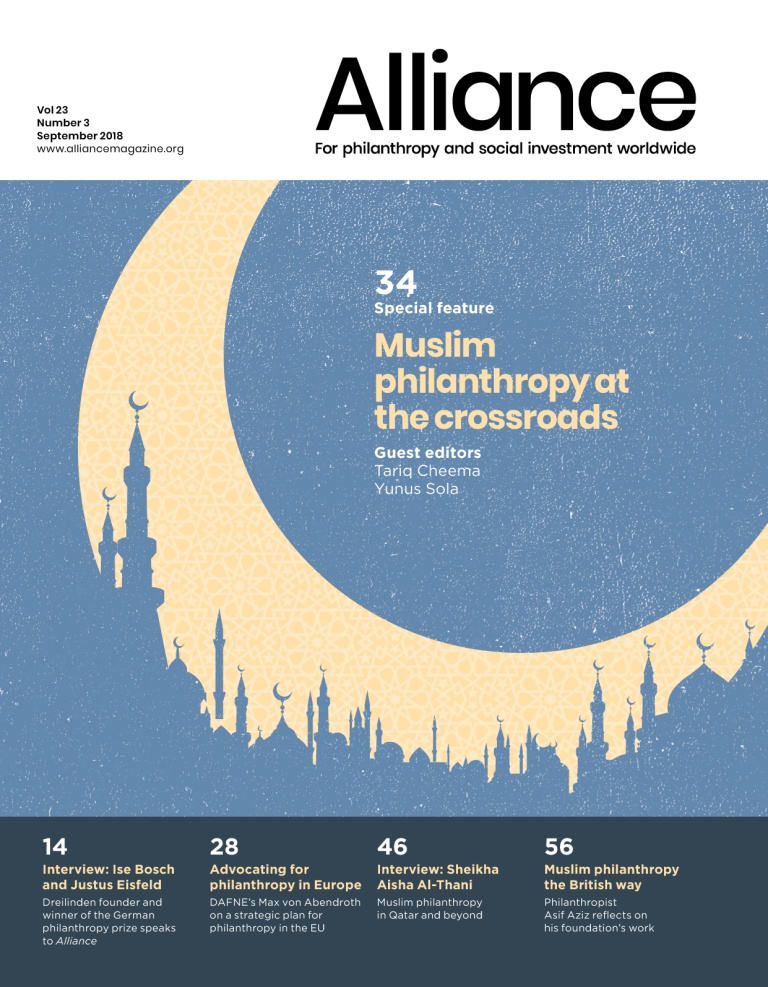The sum of the union of Muslim and British charitable traditions can be greater than their constituent parts
History is testament to the truth that religion has always been a key motive in charitable giving. All the major world religions place an emphasis on charity as an act of worship. It shouldn’t come as a surprise, therefore, that recent studies have found that religious people are more generous in their giving.
There has, however, been a recent shift in the destination of their giving. Until recently, Muslim giving has focused on donating to causes abroad. However, a recent survey of British Muslim attitudes, commissioned by the Aziz Foundation and others, and conducted by Ipsos Mori, found that younger Muslims are passionate about combating domestic inequality and poverty and have interpreted their religious obligations, zakat and sadaqa, accordingly. Philanthropists, Muslim or otherwise, would be remiss to ignore the charitable priorities of their communities who are increasingly interested in spending charity at home.
By supporting individuals, projects and organizations, we hope to be an incubator, accelerator and multiplier in developing capacity for self-help in disadvantaged communities.
Few would disagree that Britain has seen a drastic increase in economic inequality in recent years, with disadvantaged communities bearing the brunt of the economic downturn following the 2008 financial crisis and seeing little benefit from the recent upturn in the British economy. People from marginalized groups still face barriers and, in some cases, overt hostility in their lives. Facts which modern Britain often tries to pretend don’t exist.
The good news is that there are lots of people with great ideas doing important work to address some of the issues these communities face. The Aziz Foundation is seeking to make a difference by developing much stronger infrastructure to deliver positive change on the basis of community needs. By supporting individuals, projects and organizations, we hope to be an incubator, accelerator and multiplier in developing capacity for self-help in disadvantaged communities. By facilitating more holistic development, we have a much greater chance of impact and success than just piecemeal grantmaking work.
It is fortunate that British Muslim philanthropists find themselves immersed in a rich British tradition of civic giving. Philanthropy has had a significant and transformative effect on society, its civic institutions and the development of British towns and cities.
The small British Muslim philanthropic community is beginning to see significant professionalization in the sector; a trend we hope will be strengthened through a new co-ordination forum, currently being discussed between British Muslim philanthropic families and charities. It is fortunate that British Muslim philanthropists find themselves immersed in a rich British tradition of civic giving. Philanthropy has had a significant and transformative effect on society, its civic institutions and the development of British towns and cities. Consequently, Muslim philanthropists can learn valuable lessons from the collective experience of some of the UK’s most established grantmaking bodies and trusts.
To this end, the Aziz Foundation, together with other Muslim family trusts and foundations, is taking every opportunity to forge partnerships with other faith-based and secular philanthropic institutions in the UK.
Islamic trusts have much in common with traditional British philanthropy, not least the emphasis on discretion and humility in giving. However, I would argue that such an understated strategy is a luxury Muslims can ill afford given the growing anti-Muslim sentiment in Europe. Muslim philanthropists currently have an additional responsibility to act as ambassadors of our religion and encourage each other to foster an environment of solidarity and social justice for all.
The British Muslim philanthropic landscape is founded on both a robust charity infrastructure in the UK, and on strong Islamic values. It is the job of Muslim philanthropy to carry forward these values and transform the general Muslim practice of charitable giving into a long-term, sustainable programme designed to make a lasting difference in the most disadvantaged communities. And that would truly be giving the world the best we, as British Muslim philanthropists, have to offer.
Asif Aziz is chair of trustees of the Aziz Foundation.
Email enquiries@azizfoundation.org.uk
Twitter @AzizFndn



Comments (0)